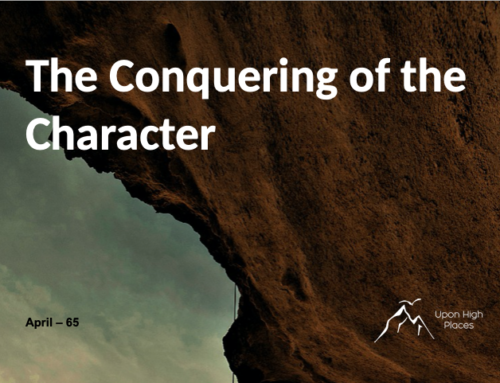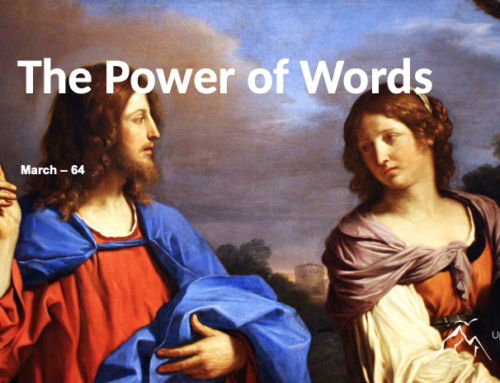Chosen of God
July 2020
My dear youth:
I greet you in the name of the Lord Jesus Christ and ask that His blessings, love, and guidance be upon you in abundance.
God chooses individuals
I’ve asked myself many times why God chooses certain people to do special and unique things. It is evident that in Bible history, which is also the history of humanity, there are very particular characters that did things that no one else did. They were men and women that changed the history of this world. Why them and not others? Does God have a preference for some and despise others? Let’s take a look.
God is not a respecter of persons
It’s a difficult task to begin to think why God chooses some and not others because in reality He would like to choose everyone. The apostle Paul teaches one of the characteristics of God that stand out when it comes to favoring human beings, “For there is no partiality with God.” Romans 2:11. The New Living Translation says, “For God does not show favoritism.” God isn’t like us that are easily inclined for one person or other depending on whether we like them or not. We easily accept or rule out a person while taking into consideration their traits, if we like them or not, if the person is pleasant or if we don’t hit it off.
It’s obvious that in this world the famous are more accepted than a person that is unknown, the rich rather than the poor, the intelligent rather than the ignorant, the attractive rather than the ugly, the powerful rather than the weak, the elegant rather than the poorly dressed, the skillful in speech rather than the slow to speak… We are naturally partial, it’s in our hearts without us cultivating it. But in God it is completely the opposite, and this is why we don’t understand God as we should.
The judges of this world, which are supposed to be impartial, incorruptible, just, and unbiased people before the accused have sometimes judged unjustly, permitting themselves to be led on by appearances, thus condemning the innocent as guilty, perhaps due to human error or other factors; the matter is that in the United States alone, 4.1% of condemned persons are judged due to judicial mistakes.
We’ve also seen that people without necessary professional qualification hold public positions and are not well equipped but are there only due to being friends or family members of powerful people who decide who will hold those positions. This has a name—it’s “nepotism.” As human beings we are imbued with these human attributes with a tendency to favor some over others.
God’s greatest pleasure
But God isn’t like this. His distinguishing characteristics are righteousness, impartiality, uprightness, goodness, holiness, mercy, truth, love, sovereignty, forgiveness, omniscience, omnipotence, etc. When we speak with God we can be certain that He will never ever be wrong about us or even treat us as we really deserve to be treated. We should value this more and be grateful each day that God doesn’t treat us as we really deserve to be treated, “He has not dealt with us according to our sins, nor punished us according to our iniquities.” Psalm 103:10. Have you ever asked yourself why God does this? Out of love! It’s a love that you and I aren’t able to understand because we are naturally selective as previously mentioned, and above all we have a highly developed memory and retain offenses inflicted on us.
But God, who is full of love for each one of us, whether we are good or evil, only wants to restore, uplift, forgive, help, embrace, and lead us to heaven. “Who is a God like You, pardoning iniquity and passing over the transgression of the remnant of His heritage? He does not retain His anger forever, because He delights in mercy.” Micah 7:18. How interesting are these words! God’s greatest pleasure is in loving us! If you ask people what they delight in, I’m sure very few would say, “In loving others.” But God’s greatest pleasure is in loving us. Let no one doubt that absolutely everyone is included in the offer of salvation; God wants to choose everyone to be saved, even evildoers.
The wicked, evil, and extremely degenerate should be destroyed by God as He has every right to do so because He abhors wickedness. But He loves the sinner. Is this easy for us human beings to understand? No. Let’s take a look at the courts of this earth. If someone is judged for being a terrorist and for killing hundreds of people, no one would imagine that by genuinely repenting they would let him go free. In countries where capital punishment exists, this person would be condemned to death and in others to life imprisonment. Can anyone argue against this? No, it’s accepted as something necessary, in fact, there’s a very popular saying among us that says, “He who lives by the sword will die by the sword.”
But God loves the vilest sinner, “‘As I live,’ says the Lord God, ‘I have no pleasure in the death of the wicked, but that the wicked turn from his way and live. Turn, turn from your evil ways! For why should you die, O house of Israel?’” Ezekiel 33:11. According to this biblical declaration God doesn’t take pleasure, that is, He doesn’t like nor is it within His plans to destroy the wicked, instead He gives them opportunities daily to repent and be saved.
This causes us to conclude that at this world’s end, when the investigative judgment comes to an end, those who are lost won’t be because God didn’t want to choose them, but because they didn’t allow themselves to be chosen by God. Let’s consider the extreme case that confirms what we are teaching. Manasseh was a very evil king in Judah; his wickedness had no equal. He was a criminal, sacrificed his children in the fire, consulted the stars, became friends with sorcerers and spiritualists, built graven images, and worshiped false gods. What else could he do to offend God? The writer who tells his story thus expresses the feeling of God, “He did much evil in the sight of the Lord, to provoke Him to anger.” 2 Chronicles 33:6.
However, when King Manasseh was taken prisoner by the Assyrians to Babylon, they humbled him to the utmost and put him in prison. It was a new situation for the king; his heart was finally touched, and he thought of God. Perhaps seriously for the first time in his life. Let’s see how this chapter of his life is described, “Now when he was in affliction, he implored the Lord his God, and humbled himself greatly before the God of his fathers, and prayed to Him; and He received his entreaty, heard his supplication, and brought him back to Jerusalem into his kingdom. Then Manasseh knew that the Lord was God.” 2 Chronicles 33:12-13. What do we see in this story? Did Manasseh deserve one more chance? He’d had a lot of opportunities in his life but had disregarded them. What divine sentence was to be given against Manasseh? If death, he deserved it. Manasseh couldn’t be chosen for salvation, as he was extremely wicked.
But, dear friend, here we have infallible proof that God isn’t impartial and that He takes pleasure in loving us, as we saw in Micah 7:18. Which is why we can’t prove with the Bible or history, neither with the facts around us that God is impartial, that He practices nepotism or acts arbitrarily with human beings, as He sees fit. And this is a great comfort for us.
Let’s remember that the sun rises for the good and evil, the fields bear fruit without taking into account the hearts of their owners who could be wicked. Air is available to all human beings; everything is kept in perfect balance even though most people have turned their backs on their Creator. You and I, and all are included in His calling of love; whosoever goes to Him will not be cast out (John 6:37). God doesn’t choose some and discard others. No. The image that God wants us to have of Him is found in the following text, “Let the wicked forsake his way, and the unrighteous man his thoughts; let him return to the Lord, and He will have mercy on him; and to our God, for He will abundantly pardon.” Isaiah 55:7.
Our decision
God wants to do great things with you and through you, but it depends on your decision. He only wants to manifest His love to humanity. We see it clearly because, first, He doesn’t treat us as we really deserve to be treated and gives us many opportunities to change. Second, He gave us the Lord Jesus that by dying on the cross opened a door of salvation for all. This is without a doubt the greatest concluding proof that God doesn’t exclude any human being; He doesn’t have a preference of race, nations, men and women already destined to be chosen. No. When the Lord Jesus died on the cross, He died for all, as confirmed by John 3:16.
Now, why does it seem like the Lord chooses some over others? This depends on our internal attitude, what we decide in our minds. The greatest serial killer of all history in the United States, as informed by the authorities has been Samuel Littel, who confessed to 93 crimes committed over a period of several decades; when he dies, if he hasn’t died already, I don’t think many will cry over him. However, could Samuel Littel be saved if he repents of his horrendous crimes? Would God forgive him? “He who covers his sins will not prosper, but whoever confesses and forsakes them will have mercy.” Proverbs 28:13. This man has to give account before human authorities, but before divine authority, if he repents of his heinous crimes, he will find mercy, just like Manasseh.
God has also chosen you and me to be His instruments of salvation. How will you answer? Remember that John was coarse and unqualified to be in the service of God, but the Lord chose Him despite his faults of character and prepared him, becoming one of the most influential people in the history of the church of Christ. What will you decide? Will you allow the Lord to shape and guide your life? Say yes. This is my desire and prayer. Amen.
José Vicente Giner
Pastor and Youth Leader of the General Conference
For meditation:
- What attributes of God do you like the most?
- How can God’s attributes help us?
- How can we show that God isn’t a respecter of persons?








